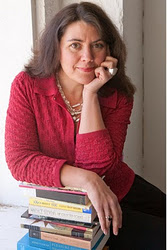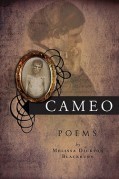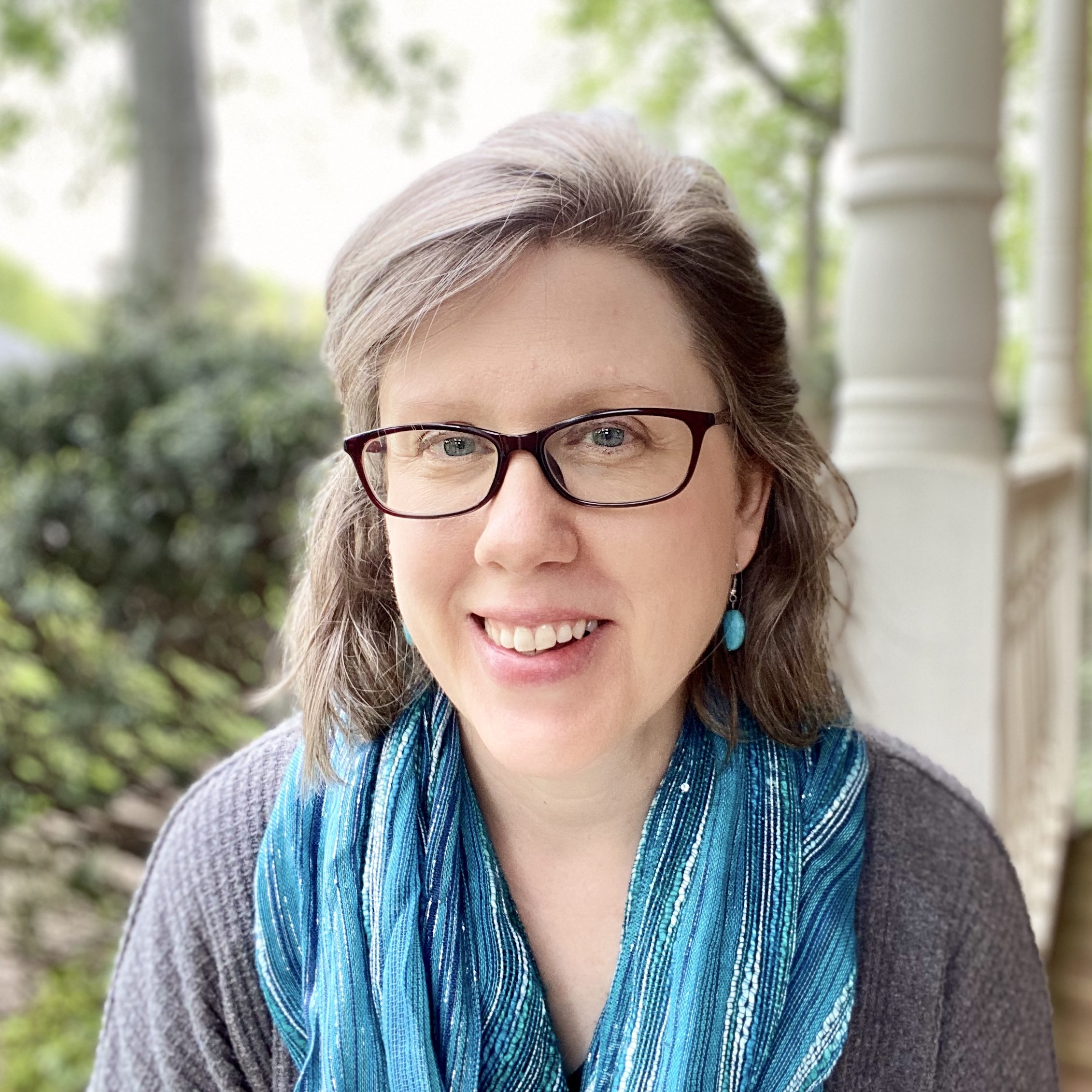I take it to be a shortcoming of my suburban sensibilities, but I frequently have trouble with the concept of beauty existing in war, violence, death and destruction, and other seemingly tragic events throughout history.
Evidently I’m not alone, as this recent article by Yeuran Zhang in Duke University’s The Chronicle suggests. In it, Lt. Col. Peter Kilmer, assistant professor at the United States Military Academy, says:
…because the public generally views war only as violent, soldiers can hardly express the beauty…
I feel sure this is painfully true, and I’m humbly grateful this isn’t something I know firsthand. I’m also grateful we have art and literature to help us, soldiers and civilians alike, with such a duplicitous task.
It’s with that in mind that I introduce CAMEO, a debut collection of poems by Melissa Dickson Blackburn, published earlier this year by New Plains Press.
The poems in CAMEO weave the complexities of family, Southern, American, and even world history in a striking, personal way. The first poem, “First Edition, 1924,” establishes a theme for the collection in its lines exploring “what we/own, what we know, and how long/we hold the things we receive.” From there Dickson Blackburn looks the past square in the eye, alternately taking on voices from history and exploring her own life:
In “George Manoa Hall,” an imprisoned Confederate soldier – “I wear/the wind through August thunder, ride/my quiet song of delirium, and bathe/in each day’s hundred deaths.”
In “America,” a young slave woman, Julia Frances Lewis – “my song/fell to the rhythm of his coming/hoof beats and he swung me to his mare/in one course pull”
In “Lub-Dup,” one of my favorites – “This is the sound of the heart, over half/is the sound of turning away.” In a short space, Dickson Blackburn takes us from the heart’s chamber to the invention of the stethoscope, to the present day scope her son holds against her own chest, to a poignant ending I won’t give away here.
For fellow poets, it’s notable that many of the poems are 14-line, counted syllable creations which may be considered contemporary sonnets in some schools of thought. While many don’t adhere closely enough to traditional blank verse rules to be considered sonnets in my mind, they undoubtedly benefit from the author’s chosen constraints.

Dickson Blackburn is a visual artist with an MFA in studio art. She's also pursuing her MFA in creative writing.
From a reader’s standpoint, I enjoyed the poems’ numerous references to art and literature, although I have to admit that a few had me (educated in computer science, not the arts) scurrying to Google. A couple of poems in the collection confuse me, such as “Daughter-in-Law,” in which I can’t quite decide the relationship of the speaker to everyone else in the poem (Ann, Jerry, you, Mother Nell, and “his mother”). On the whole, however, these are well-crafted pieces that are a joy to read and re-read. I also very much enjoyed historical notes about several poems included at the back of the book.
While this collection is replete with Confederate soldiers, Nazis, Howitzers, deployed family members, stalled plane engines, and the lure of death, it finds balance in Southern accents, humor, candor, and beautiful phrasing and imagery, such as in “What is Mortal Will Be Swallowed by Life,” based on 1 Corinthians 15:54, another of my favorites in the book.
In “Yard Sale,” the speaker confesses to selling a basket her grandfather made, a piece of her family history. Dickson Blackburn may physically rid of herself of family artifacts, but in CAMEO she holds history in a sweet embrace, and with demonstrated devotion to her craft that translates to acceptance – and maybe even unconditional love – for the past that’s formed us all.
###
Leave a comment below to enter to win a free copy of CAMEO, graciously supplied and signed by the author. (New commenters have to be approved before your comments will show.) Rules: Let’s spread a bit of literature love. In your comment, tell me a book (preferably poetry, but any genre is ok) you’ve recently read and enjoyed. The winner will be chosen by a random drawing on the evening of Tuesday, December 13th from all who have commented here or on my Facebook pages (including the Kory and Kelsey Wells fan page) by 6 PM CST on the 13th. I’ll contact the winner using the email you provide to obtain your mailing address. And if you’re not the lucky winner, you can order your own copy of CAMEO from New Plains Press.


“Cameo Art” sounds like a treasure of richly adorned historical snapshots–I’d love to have a copy! One of my recent reads is “Before the Great Troubling”: Poems by Corey Mesler.
Thank you for reading “Cameo” and for taking time to share your thoughts! I’m so glad you appreciated Lub Dub. Oh…almost forgot, I recommend “She Said” by Sue Walker, and “We Almost Disappear” by David Bottoms. Also recently enjoyed Andrew Hudgins “After the Lost War” and “Ecstatic in the Poison.”
Melissa Dickson Blackburn’s stunning poetry leaves me speechless. “Cameo” inspired me to re-read “After the Lost War” by another fine Southern poet, Andrew Hudgins. Our poets do us proud down here in the Deep South.
One of the books I’ve enjoyed recently was “Born Under Saturn, the Character and Conduct of Artists: A Documented History from Antiquity to the French Revolution.” Despite the authors’ insistence that they don’t want the book to be a collection of meandering (and contradictory) anecdotes, it’s largely what it is – and exactly what makes the book so enjoyable.
I went to art school with Melissa, and I would love to read what she has been up to!
Thanks for the review of “Cameo” my interest is peaked and would love a copy! Just finished reading “Whisper and Shout – Poems to Memorize” edited by Patrice Vecchione. A fun collection of both classic and contemporary poems geared toward children (great Christmas gift idea) but good for any age.
Thank you for the thoughtful review of Cameo, which makes me want to read it. And I was enchanted with this blog after just seeing its title. I’m so happy Irene Latham just pointed the way over here!
It’s not the most recent book I read, but some of the themes here remind me of Native Ground by Natasha Tretheway.
I dare say that I would have learned to appreciate poetry at an earlier age if you had been my sophomore English teacher in high school. Thanks for being such a great writer.
I don’t have a lot of time to read, but one of the best poetry books I have read in a long time was “Heaven Was the Moon.” I loved the imagery, and appreciate reading about good old Murfreesboro. Thanks a bunch!
Thanks to everyone who left comments here and on Facebook! I love hearing what you’re reading. I see Andrew Hudgins got mentioned by 2 commenters – I like his work, too. And Jeannine, I’m glad to see you mention Natasha Tretheway – she’s someone I really want to hear in person.
Gretchen, thanks for the very kinds words about my own poetry, and my passion for sharing poems I love. I’m always amazed at how the time flies when I get to share poems for an hour or two. Hopefully my workshop students think so, too!
OK, on to the verdict – our winner, whose name my daughter drew from little slips of paper tonight, is Kelly Bills. Congratulations, Kelly! I’ll be in touch to discuss arrangements. For those of you who didn’t win, you can order a copy of CAMEO here: http://www.newplainspress.com/The_Poetry_Catalog.html
I hope you’ll check back soon – I have another review/giveaway coming up as soon as I can get it written! Thanks for visiting!
Thanks again, Kory! And thanks to those who commented. Kelly, I hope you enjoy the book!